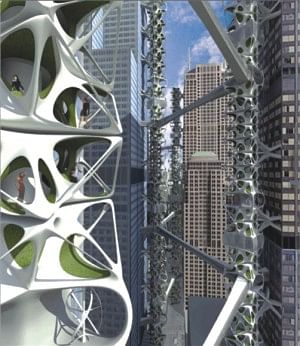|
Neighbours
Too Fast for City Planners
LE THANH
 More than half of the world's 6.6 billion people now live in towns and cities, reports the United Nations. More than half of the world's 6.6 billion people now live in towns and cities, reports the United Nations.
And the number of urban dwellers is likely to total almost five billion by 2030 with most of the growth in Asia and Africa, it says. So far mega cities have been the focus of attention.
But most of the new growth will occur in the smaller towns and cities that have the least of the resources needed to cope with the magnitude of the change.
The truth is the wave of urbanisation is too big and travelling too fast for planners and policymakers to anticipate all of its consequences.
The figures are stark. The number of people living in the cities of Asia and Africa increases by about an average of 1 million each week.
Urban poverty is now growing faster than rural poverty. An estimated 1 billion people now live in overcrowded, polluted and dangerous urban slums where they lack such basic services as clean water and sanitation.
UN General Secretary Ban Ki-moon provided a graphic description of the world's slum dwellers in his message for World Habitat Day that falls on the first Monday of October every year.
"Typically living in developing countries, and largely powerless, disenfranchised and under the age of 25, the urban poor are too often condemned to a life without basic rights, hope of an education or decent work," he said.
"Lacking the adequate provision of fresh water, electricity, sanitation or health care, they suffer privations that all too often provide the tinder for the fires of social unrest.
"Vulnerable to exploitation and corruption, they need and deserve better cities and a better life."
But the UN general secretary did not believe the challenges that arise from urban poverty from pollution to criminal gang culture were insurmountable. Many cities had found a way out of the difficulties.
These were the smart cities which recognise the importance of effective governance, basic urban services for all, and streets and public spaces where women and children feel safe.
They also recognised that better cities help mitigate such potential calamities as climate change through the promotion of energy conservation and environmental sustainability.
World Habitat Day with its theme "Better City, Better Life" this year highlighted the actions and policies that could improve the well-being for the millions who live in slums and other sub-standard housing around the world, the secretary general explained.
But these required the combined effort of national and local governments, civil society and the private sector supported by the UN to make better cities for a better future for all.
 Target 11 of Millennium Development Goal 7 is to have achieved significant improvement in the lives of at least 100 million slum dwellers by 2020 and the international community recognises that for this to happen, it will have to address directly the needs of the burgeoning numbers of urban poor by 2015. Target 11 of Millennium Development Goal 7 is to have achieved significant improvement in the lives of at least 100 million slum dwellers by 2020 and the international community recognises that for this to happen, it will have to address directly the needs of the burgeoning numbers of urban poor by 2015.
UN-HABITAT has been given the task of helping to monitor and gradually attain the "Cities without Slums" target. It believes that all member States have the necessary science at their disposal to mitigate most slum-dweller problems.
They also have the tools and knowledge to ensure effective governance, education especially for women and girls health services, sanitation and energy efficiency.
UN-HABITAT will focus on fostering economic opportunities through labour-intensive projects while promoting the poor's political and cultural inclusion as part of its effort to ensure they too enjoy a sustainable quality of life.
Cities are civilisation's greatest work. Ensuring a successful transition to urbanisation is essential, if they are to remain so.
Viet Nam News/ANN
Copyright
(R) thedailystar.net 2010 |
